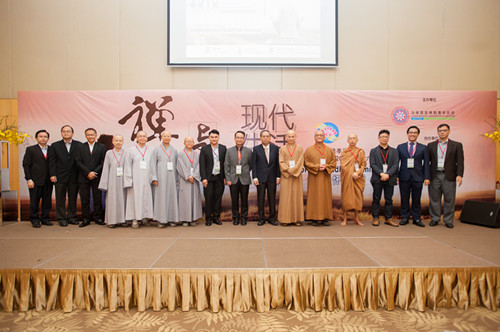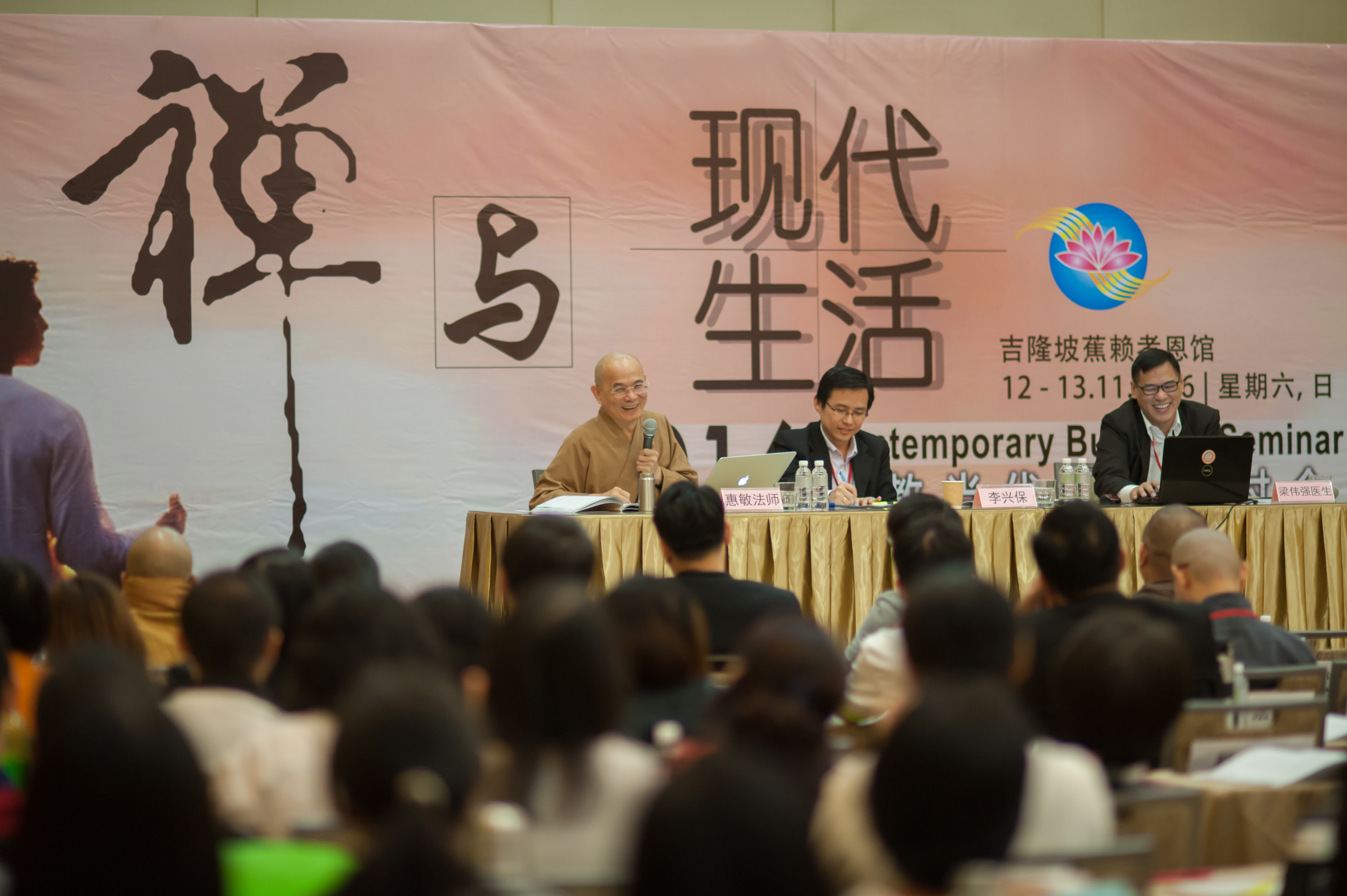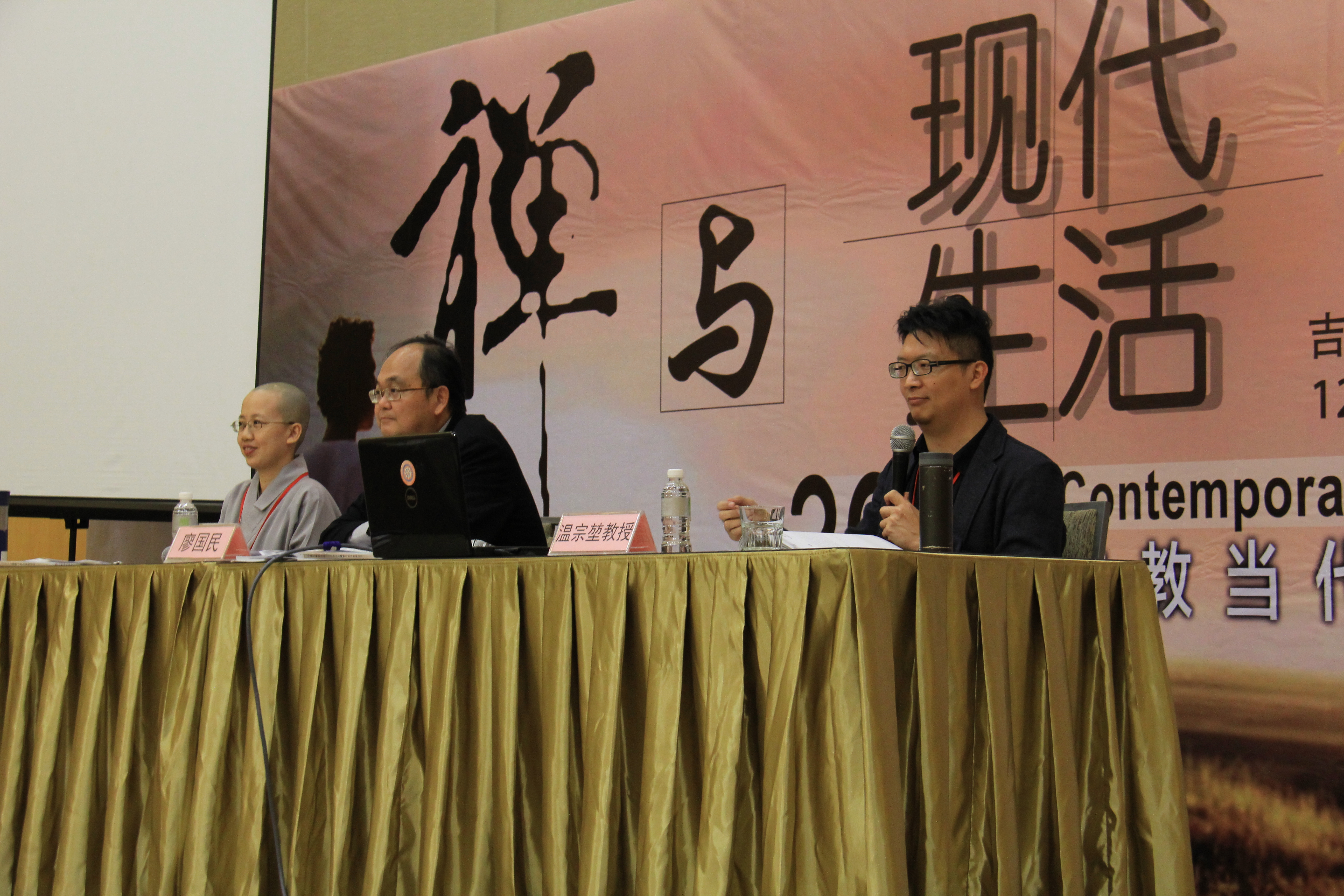2016 Contemporary Buddhist Forum in Malaysia

The 2016 Contemporary Buddhist Forum, organized by the Young Buddhist Association of Malaysia (YBAM) and co-sponsored by Xiao En Group, Fo Guang Shan Malaysia, and Dharma Drum Mountain Buddhist Centre Malaysia, was held at the Xiao En Center, Cheras, Kuala Lumpur, on November 12 and 13. With “Chan and Modern Life” as the main theme, the biennial forum invited Ven. Hui Min, president of the Dharma Drum Institute of Liberal Arts (DILA), Wen Zungkun, assistant professor at DILA, and Ven. Chang Zao, director of Dharma Drum Mountain Buddhist Centre Malaysia, to be the keynote speakers respectively for two different topics.
The organizer noticed that recently the general public has been enthusiastic about releasing stress and negative feelings through meditation practice, allowing various forms of meditation activities to mushroom in society. In response to this phenomenon, YBAM organized the Chan and Modern Life forum to explore the development of meditation practice in different areas of life and the correct ideas of Chan Buddhist practice. The forum was well received, with a participation of some 300 people.

Featuring four topics, the forum discussed Chan and modern style of life from the Buddhist, social, scientific, and medical perspective. In exploring the topic, “Chan Practice and Science,” Doctor Liang mentioned the healing effect of meditative practice and held that non-medicine treatment would be a future focus in complementary medicine, with Chan practice playing a crucial role in this area; while the venerable explored the connection between Chan practice and the science of mind in terms of the Buddhist principle of four foundations of mindfulness and the scientific theory of triune brain, and went on to propose how Chan Buddhist practice could help modern people develop desirable habits through liberal arts education.
The triune brain, as Ven. Hui Min introduced, refers to the primal brain that regulates our life functions (body), the second brain responsible for the emotions (perception), and the new brain, or neo-cortex, in charge of the cognitive functions (mind). The venerable found that the triune brain evolution theory is coincidentally in line with the four foundations of mindfulness, which requires the contemplation of the body, sensation, mind, and dharma (phenomena). Through meditation practice that trains our “mental muscles,” we can thus make optimal use of our triune brain. By practicing observing, facing, and handling the arising and perishing of our thoughts, we can eventually enter the practice of contemplating all phenomena as devoid of inherent existence and thereby realizing the ultimate truth. He went on to point out that the key to practice is to get in good habits, and advised the “ten precepts to practice good habits,” including five precepts regarding the body-mind—smiling, brushing teeth properly, doing regular exercise, eating healthy, and sleeping well—and the other five governing lifelong learning—reading, noting, researching, presenting the results, and implementing. He said that Chan Buddhism stresses daily life practice, as good habits help calm the body and mind, and facilitate the attainment of wisdom and freedom.

Ven. Chang Zao and Prof. Wen Zungkun spoke on “Chan Practice and Society.” The venerable clarified the usual misconceptions about Chan practice, and explained that it is an approach to developing selfless wisdom, and helps us understand society’s needs and provide suitable guidance for people. She pointed out the benefits of practicing Chan in daily life: a balanced emotion and calm body-mind; being able to freely take up and let go; a mind free of attachment, calming abiding in the present; and a caring compassionate mind transcending opposition. The venerable concluded that Chan practice helps us recognize our self and thereby realizing no-self, through which we can better care for society, let go of self interests and forget about gain and loss, attaining personal purity and achieving a stable society.
Prof. Wen approached Chan practice and social issues from the perspective of Mindfulness-Based Stress Reduction (MBSR). As he mentioned, mindfulness is an awareness and attitude of non-judgment. MBSR courses transcend religion, allowing non-Buddhists to also benefit from the practice of mindfulness. He pointed out that mindfulness courses are currently facing challenges, with the Buddhist circles regarding the courses as secularizing Buddhism and deviating from the Buddhist teachings. By using his personal experiences and quoting Buddhist texts, he explained that the MBSR has helped and benefitted many, and it is recorded that the Buddha had actually allowed non-Buddhists to learn mindfulness meditation. Therefore, modern society should consider promoting mindfulness practice, as well as combining interdisciplinary research efforts to explore its depth and applications, enabling more people to benefit from it.
The subject of Chan Practice and Society received a more enthusiastic response from the participants, who asked the key-note speakers interested questions about the discussion, indicating the public’s concern over this issue.
Reporter: Kuo Tzuwei(郭紫薇)
Photographer: Chen Shanpei(陳善沛), Lin Mingchin(林銘沁)
Translator: Frances Liu (劉珮如)
Editor: Chang Chiacheng (張家誠)